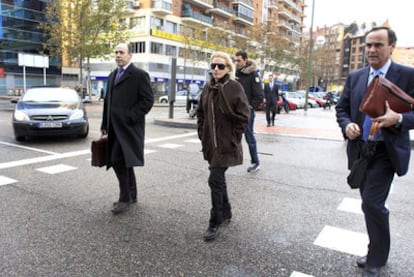Domínguez doping case dismissed
World champion cleared of supplying prohibited substance to fellow athlete
A Madrid court on Wednesday shelved one of three accusations against Marta Domínguez and her agent, José Alonso Valero, in the ongoing Operation Greyhound investigation, a broad-ranging inquiry into a blood-transfusion ring linked to Spanish track and field. The court threw out the allegation relating to the supply of a banned substance by Domínguez to long-distance runner Alberto García last November, but made plain that the dismissal was "exclusively" connected to that aspect of the case against the 3,000-meter steeplechase world champion.
Domínguez also faces two separate allegations of a tax offense and of administering medication without a license to Eduardo Polo, her training pacemaker.
The judge, Mercedes Pérez Barrios, based her decision on the analysis of samples by the Spanish Anti-Doping Agency and the State Medication Agency. Neither body uncovered traces of banned substances in the contents of a vial delivered to García by Domínguez. "It is concluded," the court report said, "that the substance is not trenbolone, nor any derivative of same, and that it does not contain testosterone nor its derivatives, nor boldenone, mesterolone, methandienone, methenolone, methylone, methyltestosterone, nandrolene, nandrolone, oxandrolone, oxymetholone or stanozolol."
Domínguez's defense lawyers now believe that the two other allegations against the athlete will be dismissed. Documentation has been presented to the court demonstrating that Domínguez has not committed any tax crime, according to her legal team.
The suspicion of supplying a banned substance unfolded on November 17, 2010. Domínguez and Alonso Valero had met for lunch, under the watchful eye of the Civil Guard. Officers photographed the athlete handing her agent a package destined for Alberto García. This, according to investigators, contained the "gold" or "rum" that wiretaps had heard Domínguez and García discussing a week earlier and led Judge Pérez Barrios to launch Operation Greyhound. The Civil Guard believed the reference to "gold" to be doping slang.
When Domínguez and Alonso Valero left the restaurant, investigators stopped their vehicle and discovered a vial in the package. However, they let the pair continue their journey and the vial ended up in the possession of Alberto García, according to the police.
Three weeks later Greyhound broke, leading to the arrests of 14 people, including Eufemiano Fuentes, the alleged ringleader of the Operation Puerto doping ring in cycling; his point man in Madrid, former professional mountain biker Alberto León, who committed suicide in January; and Domínguez.
A month later Pérez Barrios carved up the case into four separate proceedings, dissociating Domínguez from Fuentes, who awaits trial in both the Puerto and Greyhound cases on public-health charges.
García told the court in his first statement to the Civil Guard that the vial contained trenbolone. However, when giving evidence in court under oath, he changed his story. According to Domínguez's statement and her testimony, "gold" refers to a natural product the pair purchased in the United States that is used to aid muscle repair.

"Irreparable damage"
Marta Domínguez's lawyer, José Rodríguez, on Wednesday expressed his satisfaction over the shelving of the allegation against his client for supplying a banned substance, but he also stated the matter had caused "irreparable damage."
"Whether you like it or not, it has generated doubt in the public eye. There are many people on her side and others who have their doubts. We hope it will not affect her future," Rodríguez said. Domínguez's agent José Alonso Valero, also implicated in the case, went further: "The dynamic of the press has been truly repugnant. It is as though they threw raw meat into the arena and everybody went in for the slaughter. We have had the patience of a saint and haven't opened our mouths despite everything and we will continue to do so until everything has been cleared up," Alonso Valero said.
The celebrity of Domínguez has ensured that the case against her has reverberated even among Spain's political class. The regional government of Castilla y León, in which lies Domínguez's home town of Palencia, called for "a great effort" to repair the image of the athlete in the region, Spain and abroad. "We must work together to restore the honor of one of the best in the sporting sphere," said its spokesman, José Antonio de Santiago-Juárez.
Even Deputy Prime Minister Alfredo Pérez Rubalcaba was obliged to hold forth on the matter to the press after Wednesday's Cabinet meeting: "To believe the government wants to call into question Spanish sport in its entirety to me is insanity on the part of someone with an unsustainable fixation. The Civil Guard acts when it has information on a crime. It does not receive orders from the [Interior] Ministry. There is nothing left to say until the matter is over."
Tu suscripción se está usando en otro dispositivo
¿Quieres añadir otro usuario a tu suscripción?
Si continúas leyendo en este dispositivo, no se podrá leer en el otro.
FlechaTu suscripción se está usando en otro dispositivo y solo puedes acceder a EL PAÍS desde un dispositivo a la vez.
Si quieres compartir tu cuenta, cambia tu suscripción a la modalidad Premium, así podrás añadir otro usuario. Cada uno accederá con su propia cuenta de email, lo que os permitirá personalizar vuestra experiencia en EL PAÍS.
¿Tienes una suscripción de empresa? Accede aquí para contratar más cuentas.
En el caso de no saber quién está usando tu cuenta, te recomendamos cambiar tu contraseña aquí.
Si decides continuar compartiendo tu cuenta, este mensaje se mostrará en tu dispositivo y en el de la otra persona que está usando tu cuenta de forma indefinida, afectando a tu experiencia de lectura. Puedes consultar aquí los términos y condiciones de la suscripción digital.








































